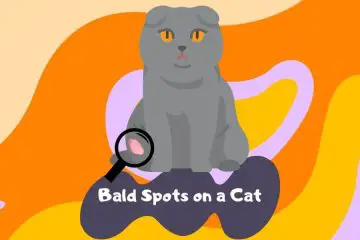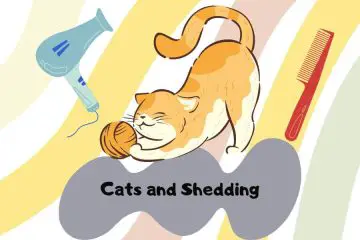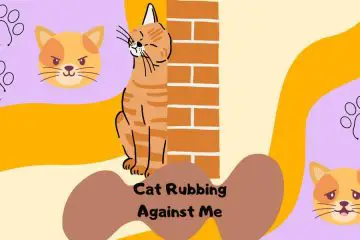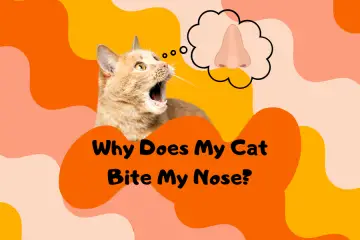Key Takeaways
- Cats make chirping, chattering and trilling noises out of excitement or frustration, as a greeting, or to get your attention
- Excessive chirping can indicate stress or anxiety, which should be addressed by consulting a vet
- Other cat vocalizations include meowing, purring, growling, hissing and spitting
- If living with an overly talkative pet becomes too disruptive, you can train your cat to be quieter by rewarding them when they stop vocalizing
What Is Chirping in Cats?
One of the most endearing cat behaviors is chirping or chattering when they’re stalking a bird or squirrel. While these sounds are similar to chirps made by birds, they’re actually quite different. In fact, there are a few different reasons why your cat might chirp or make other noises. One of them is their hunting instinct.
Why Does My Cat Chirp or Chatter?
Why does my cat chirp? The most common reason for chirping (as shown in the video above) is excitement, often in response to seeing a bird or another animal outside. Some behaviorists also theorize that it’s a sign of frustration – the cat can’t reach the enticing prey they see.
Other chirping sounds, or trills, may be a way for cats to get attention from their human companions. If your cat starts chirping when you walk in the door, it may be because they’re happy to see you and want some attention!
Did you know that a mother cat chirps at her kittens to get them to follow her? Your cat may be doing the same to you! For example, if your kitty walks up to a toy and chirps at you, they may want you to play with them. Here’s a video of a kitty trilling as she waits for her human to throw a toy:
Is Chirping Normal Behavior for Cats?
While chirping is a perfectly normal behavior for cats, some may do it more often than others. If your pet is chirping excessively, it could be a sign that he’s feeling stressed or anxious. If you’re concerned about your cat’s chirping, talk to your vet to see if there might be an underlying medical condition or psychological issue that needs to be addressed.
Editor’s Note
Some cats are naturally more vocal than others. For example, Siamese cats are known for meowing, trilling, and chirping all the time. It’s just the way they are – let your pet express themselves! However, if you have any concerns about your cat’s vocalizations and behavior, it pays to consult with a professional.
How Can I Stop My Cat From Chirping and Chattering?
Cats are very expressive animals, so don’t be surprised if yours takes after its wild ancestors by chirping or trilling when playing or expecting something from their humans. But if you find yourself asking “Why does my cat chirp?” too often, or if it’s causing you concern, there are a few ways to reduce it.
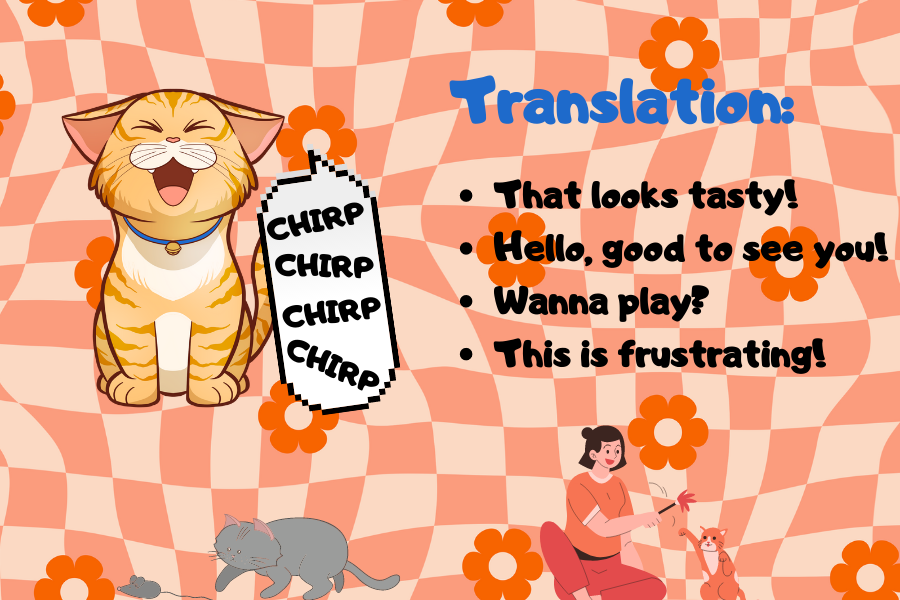
First, make sure that your cat has plenty of toys and playtime to keep them stimulated and help them release excess energy. Also, provide a scratching post for them to scratch and stretch on. Here are a few more specific tips:
- If your cat is constantly chirping in response to something outside, you can try closing the curtains or blinds to reduce his visual stimulation.
- If they’re chirping in response to you, they’re likely seeking attention and may need you to spend more quality time with them.
- Finally, if your cat’s chirping seems to be due to anxiety or stress, talk to your vet about possible treatments, such as behavior modification therapy or anti-anxiety medication.
Pay Attention to Your Cat’s Body Language
While chirping is a normal behavior for cats, it’s important to pay attention to how often and under what circumstances your cat is doing it. Do they display anxious body language, too? For example, does your cat tuck her tail between her legs, crouch down low, or freeze when she chirps? These behaviors can indicate stress and should be addressed.
Other Sounds Cats Make: Purring, Yowling, Trilling, and More
In addition to chirping, cats make a variety of other sounds, including:
- meowing;
- purring;
- trilling;
- growling;
- yowling;
- hissing.
Each of these vocalizations has a different meaning and purpose. Meowing is typically used as a way to communicate with humans. Cats meow to ask for food, attention, or simply to say hello. Purring is normally a sign of contentment and happiness, but it can also be a way for a cat to self-soothe when they’re feeling pain or stress.
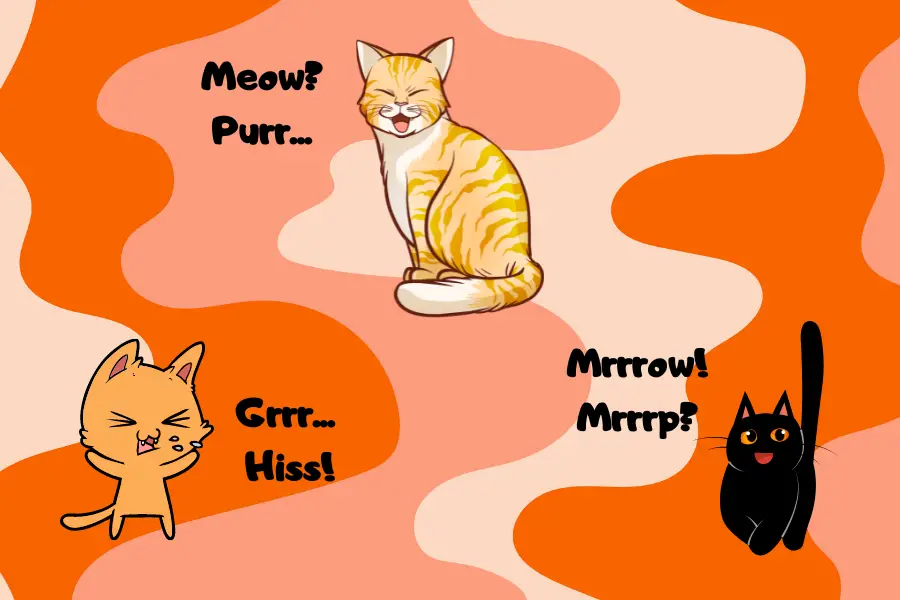
Trilling is something between purring and meowing – it’s a vibrating noise cats make when they’re excited or greeting someone they recognize. Growling, hissing, and spitting are used by cats to communicate aggression. If your cat is making any of these three noises, it’s vital to take note and address the behavior appropriately.
Why Do Some Cats Make No Sounds?
There are medical conditions that can cause you to stop wondering “Why does my cat chirp?” and instead think “Why doesn’t my cat make any sounds at all?”. These include laryngitis (inflammation of the larynx), viral infections, and tumors. If your cat suddenly stops making any sounds, it’s critical to take them to the vet for an examination.
In some cases, a cat may stop meowing and chirping if they’re feeling anxious or stressed. If you think this might be the case, try to create a calm and relaxing environment for your cat. If the problem persists, talk to a vet and/or cat behaviorist about possible treatments.
How to Deal With a Talkative Pet?
If you’ve ruled out any medical or psychological reasons for your cat’s excessive chirping, and you’ve tried different methods to reduce it, you may just have to accept that your cat is a “talker.” Some cats are simply more vocal than others, and there’s not much you can do to change that. However, there are a few things you can do to make living with a talkative cat a bit easier.
- Give your cat plenty of toys and playtime to help them release excess energy.
- Consider getting a second cat, as having a companion can help reduce boredom.
- If you’re finding your cat’s chirping to be excessive or disruptive, you can try training them to stop. For example, reward your cat with treats or attention whenever they stop vocalizing. This will help them learn that being quiet is a good thing.
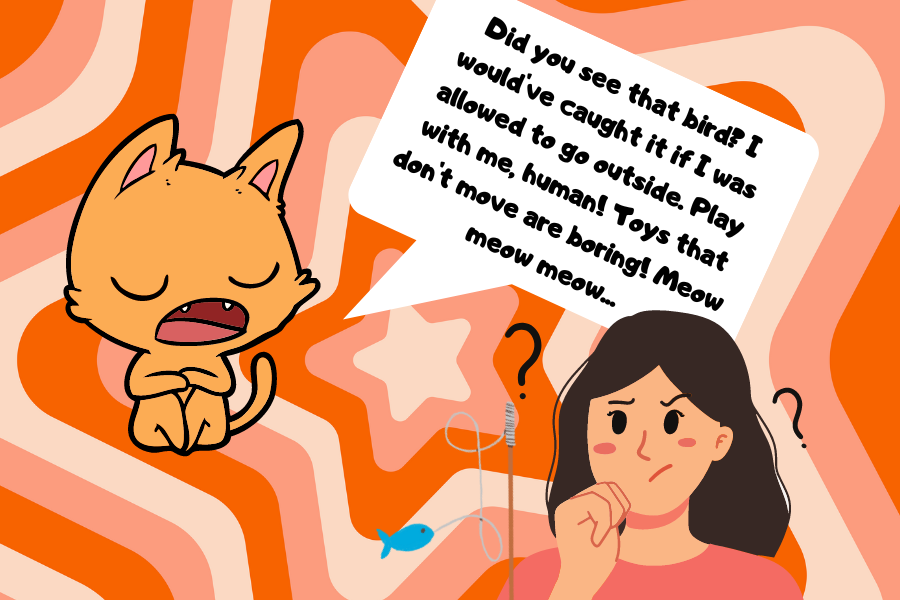
Living with a talkative cat can be challenging, but remember that they’re just trying to communicate with you in the only way they know. And if you were just wondering “Why does my cat chirp?” out of curiosity, now you know!
Frequently Asked Questions
Is It Rare for Cats to Chirp?
No, it’s actually quite common. While some cats may chirp more than others, most cats do it at least occasionally. For example, they may chirp whenever they jump on a high piece of furniture. Enjoy observing your kitty’s quirks!
Why Does My Cat Chirp When I Pet Him?
He may be communicating that he’s happy, or that your stroking surprised him. It’s hard to say for sure, but you can always experiment by stopping and starting your petting to see if it has any effect.
What Is the Difference Between a Cat Chirp and Trill?
Most people say that their cat „chirps” when they chatter at something outside, and „trills” when they make a noise directed at a person. But to others, trilling sounds like chirping, so they might call it that instead.
What Kind of Cat Chirps Instead of Meows?
Maine Coons are known for their wide range of chirps and other vocalizations. Many cats that are filmed looking out of the window and chirping at birds are long-haired, so they may belong to this breed.
Thom Kenley is an author and loves writing about pets. He’s always been a pet lover, and he enjoys sharing his stories and tips with others who love their furry friends just as much as he does. He’s written articles for various websites and magazines, and he’s excited to continue writing about pets and helping owners keep their animals healthy and happy.
